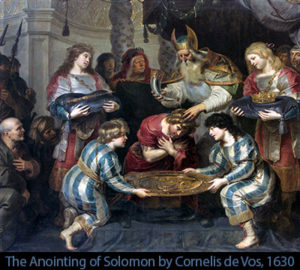Wisdom gives strength to the wise man more than ten rulers who are in a city.
Surely there is not a righteous man on earth who does good and never sins.
Do not take to heart all the things that people say, lest you hear your servant cursing you. Your heart knows that many times you yourself have cursed others.
All this I have tested by wisdom. I said, “I will be wise,” but it was far from me. That which has been is far off, and deep, very deep; who can find it out?
I turned my heart to know and to search out and to seek wisdom and the scheme of things, and to know the wickedness of folly and the foolishness that is madness. And I find something more bitter than death: the woman whose heart is snares and nets, and whose hands are fetters. He who pleases God escapes her, but the sinner is taken by her. Behold, this is what I found, says the Preacher, while adding one thing to another to find the scheme of things– which my soul has sought repeatedly, but I have not found. One man among a thousand I found, but a woman among all these I have not found. See, this alone I found, that God made man upright, but they have sought out many schemes.
Who is like the wise? And who knows the interpretation of a thing? A man’s wisdom makes his face shine, and the hardness of his face is changed. – Ecclesiastes 7:19-8:1
The first verse in this section tells you what it is about. It’s like an editor’s section heading: “Wisdom gives strength to the wise man more than ten rulers who are in a city.” The wisdom that Solomon is saying gives strength is the wise man’s discerning knowledge of the depravity of man. Solomon himself knows: “I turned my heart to know and to search out and to seek wisdom and the scheme of things, and to know the wickedness of folly and the foolishness that is madness.” A father, mother, employer, pastor, or teacher who has learned what Solomon describes here has more strength than ten foolish rulers in a city.
The first point Solomon makes is that even the righteous will sin: “Surely there is not a righteous man on earth who does good and never sins.” We have to be careful that we don’t misread this as saying that there is no one who can be called righteous. Immediately before this passage in v. 15, Solomon speaks of a “righteous man” who dies young while doing righteously. It is rather commonplace, especially among reformed people, to quote Romans 3 glibly, “There is no one righteous; no not one,” and scoff at the idea that we’re all anything but totally depraved.
But let’s be careful because Solomon unapologetically speaks of a righteous man. What’s going on? When Paul writes that in Romans 3, he is quoting Psalm 14, which is speaking of Jewish evildoers and fools who say in their heart, “There is no God.” In Romans 3 he’s still talking about unfaithful Jews. Among them: there is no one righteous, no not one.
It’s possible to be so impressed with the depravity of man that you see sinfulness in the Bible when it isn’t there. True, we are all sinners, and everything we do is tainted with sin, but it is not the best way to read every text. In this case in Ecclesiastes, Solomon is not saying that there is not a righteous man on earth. He is saying that even of the righteous men on earth, all sin. No one is perfectly wise. Wisdom knows that it cannot understand much about human nature, but it must at least know that all sin. Know this and you’ll have the wisdom that leads to strength, perhaps even more than ten rulers who are in a city.
He goes on with another illustration about people talking bad about you behind your back, and then another about Madame Folly, “the woman whose heart is snares and nets, and whose hands are fetters.” The wise, knowing the depravity of people, avoid these traps and dangers. Still there is great mystery: “See, this alone I found, that God made man upright, but they have sought out many schemes.” Sin makes the incomprehensible complexity of human nature even more mysterious.
This offers a great deal of insight into the coming of Jesus. As the Apostle John says in his first epistle, “You know that he appeared in order to take away sins, and in him there is no sin,” which then helps us understand with the writer to the Hebrews, “Christ, having been offered once to bear the sins of many, will appear a second time, not to deal with sin but to save those who are eagerly waiting for him.” For whom is Jesus going to return? For fools? No. For the wise who’ve had their sins borne by Jesus and pursue righteousness and wisdom. It’s obvious, for “a man’s wisdom makes his face shine, and the hardness of his face is changed.” That’s the gospel.
Come hear it preached and enacted in the supper with Jesus this Sunday.
